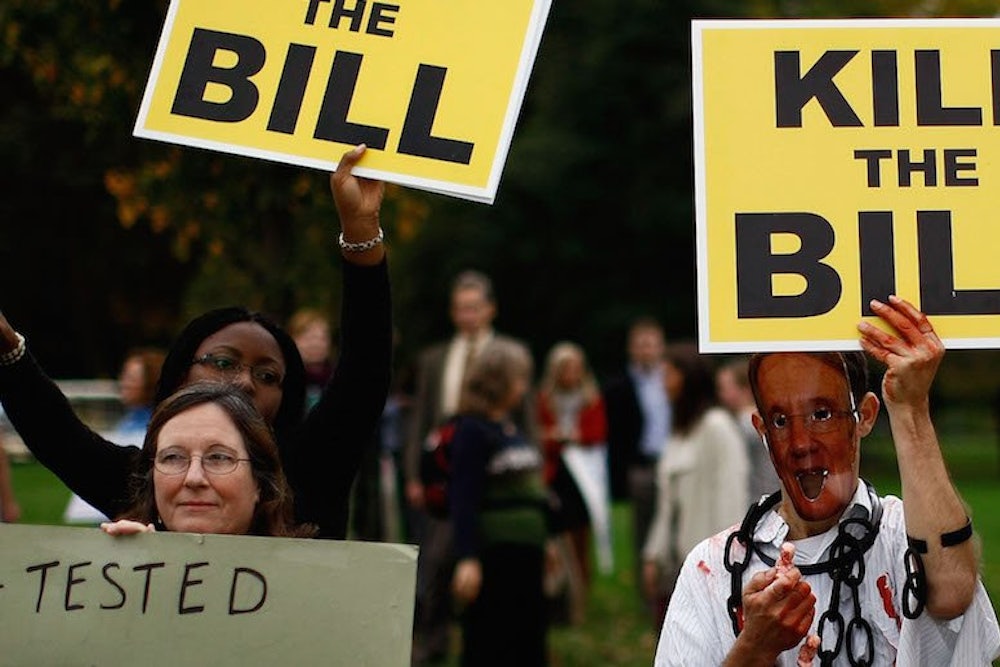Chief Justice John Roberts’s lone substantive interjection during oral arguments in King v. Burwell hinted at a fox-like deviousness. Perhaps the Affordable Care Act’s subsidies should survive in all states, but perhaps, too, the law is ambiguous enough that a future Republican president could discontinue those subsidies in states that didn’t establish exchanges.
Keep the dream of hobbling Obamacare alive, but also leave it in the realm of politics.
But Roberts did something different, and deeply unexpected, instead. He wrote an opinion, preserving all subsidies, that marks the end of the line for Obamacare’s most zealous challengers. Before Thursday morning, most close Court watchers believed there were about five plausible outcomes in King. Roberts sidestepped all of them.
Instead, he authored an opinion, joined by the Court’s four liberals, and conservative Justice Anthony Kennedy, that leaves the law’s challengers with the measliest of consolation prizes: He allowed that they, in all their certitude of hindsight, weren’t completely insane. They put forth a plausible-seeming construction of the statute, but one that’s ultimately impermissible, in part because their supporting theory—that Congress intended to use the law's subsidies as a weapon against states—is completely risible. The King v. Burwell story ends today.
“Petitioners’ arguments about the plain meaning…are strong,” the opinion concludes. “[But] the context and structure of the Act compel us to depart from what would otherwise be the most natural reading of the pertinent statutory phrase.”
The Court’s majority holds that the text at issue—"an Exchange established by the state," the ACA states—“is properly viewed as ambiguous,” and plausibly “refers to all Exchanges—both State and Federal—at least for the purposes of the tax credits.”
Which is to say, the government was within its rights to distribute tax credits through all exchanges in every state, regardless of their provenance.
The typical underpinning of a holding like this would be what’s known as “Chevron deference,” a canon which assumes that when statutes are ambiguous, Congress has implicitly delegated authority to federal agencies to interpret them. But Roberts and the majority determined that this standard should not apply. That ambiguity aside, the statute compels the IRS to issue tax credits in every state.
“‘In extraordinary cases, however, there may be reason to hesitate before concluding that Congress has intended such an implicit delegation,’” the opinion reads. “This is one of those cases. The tax credits are among the Act’s key reforms, involving billions of dollars in spending each year and affecting the price of health insurance for millions of people. Whether those credits are available on Federal Exchanges is thus a question of deep 'economic and political significance' that is central to this statutory scheme; had Congress wished to assign that question to an agency, it surely would have done so expressly.”
The ruling thus combines a standard textualist mode of interpretation—a view to the statute’s full context to determine the meaning of isolated provisions—with a common sense analysis of the law’s structure into a mode of interpretation you might call heurism. Congress wrote a law that authorizes subsidies everywhere both because the law says so, but also because Congress obviously didn’t write a law that with the capacity to self-destruct.
That the Affordable Care Act survived this challenge isn’t a surprise. After oral arguments in March, some of its most confident detractors walked away assuming that the Court would uphold the subsidies. But it was widely suspected that the opinion would expose a new thread for conservatives to pull. According deference to the Obama administration would allow a Republican president to revisit the issue and void the subsidies unilaterally. On another reading, the Court could have determined that the challengers interpretation of the ACA confronted states in such an onerous decision that it amounted to unconstitutional coercion, and thus invited new challenges to different laws that empower the federal government to apply pressure to states.
The opinion the Court actually wrote turns out to be perfectly stitched. A victory for the government, and little succor for Obamacare foes, which is exactly as it should be.
